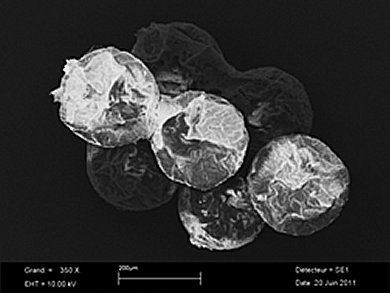Polymerization in a two-phase dispersion system, such as suspension reactions, is the main method for obtaining polymer particles. Microreactors are an appropriate device for polymerization, further adding analytical tools which allow reaction monitoring.
Because PVC is insoluble in its own monomer, vinyl chloride monomer (VCM) polymerization is a heterogeneous process involving several physical transitions. The final PVC product is composed of primary particles and their agglomerates. The kinetic monitoring of suspension polymerization is a challenging task due to the high heterogeneity of the reaction medium.
Laurent Prat, Université de Toulouse, France, and colleagues designed a novel capillary-based microfluidic device to follow the vinyl chloride polymerization reaction. Monodisperse droplets of 200 µm diameter could be obtained by means of a co-flow generation system, each one being considered as a polymerization reactor. Monomer droplets were visualized in a microchannel with a high-speed camera. At the end of the reaction, PVC grains were observed with a scanning electron microscopy technique. Real-time noninvasive Raman measurement was performed on stationary vinyl chloride monomer droplets.
A first model of the polymerization kinetics was performed with satisfactory results. Further improvement of a mathematical calibration technique may increase the measurement accuracy.
- Online Monitoring of Vinyl Chloride Polymerization in a Microreactor Using Raman Spectroscopy,
Miruna Dorobantu Bodoc, Laurent Prat, Catherine Xuereb, Christophe Gourdon, Thierry Lasuye,
Chem. Eng. Technol. 2012, 35 (4), 705–712.
DOI: 10.1002/ceat.201100564




